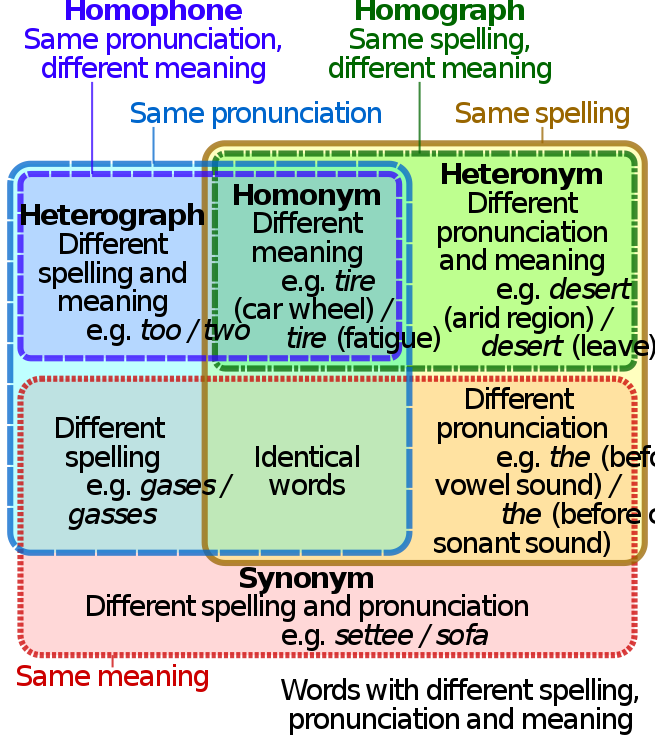
Main Difference
The main difference between Homonym and Homophone is that the Homonym is a one of a group of words that share the same spelling and the same pronunciation but have different meanings and Homophone is a word that has identical pronunciation as another word, but differs in meaning.
-
Homonym
In linguistics, homonyms, broadly defined, are words which sound alike or are spelled alike, but have different meanings. A more restrictive definition sees homonyms as words that are simultaneously homographs (words that share the same spelling, regardless of their pronunciation) and homophones (words that share the same pronunciation, regardless of their spelling) – that is to say they have identical pronunciation and spelling, whilst maintaining different meanings. The relationship between a set of homonyms is called homonymy. Examples of homonyms are the pair stalk (part of a plant) and stalk (follow/harass a person) and the pair left (past tense of leave) and left (opposite of right). A distinction is sometimes made between true homonyms, which are unrelated in origin, such as skate (glide on ice) and skate (the fish), and polysemous homonyms, or polysemes, which have a shared origin, such as mouth (of a river) and mouth (of an animal).In non-technical contexts, the term “homonym” may be used (somewhat confusingly) to refer to words that are either homographs or homophones. The words row (propel with oars) and row (argument) and row (a linear arrangement of seating) are considered homographs, while the words read (peruse) and reed (waterside plant) would be considered homophones; under this looser definition, both groups of words represent groups of homonyms.
The adjective homonymous can additionally be used wherever two items share the same name, independent of how close they are or aren’t related in terms of their meaning or etymology.
-
Homophone
A homophone is a word that is pronounced the same (to varying extent) as another word but differs in meaning. A homophone may also differ in spelling. The two words may be spelled the same, such as rose (flower) and rose (past tense of “rise”), or differently, such as carat, and carrot, or to, two, and too. The term “homophone” may also apply to units longer or shorter than words, such as phrases, letters, or groups of letters which are pronounced the same as another phrase, letter, or group of letters. Any unit with this property is said to be “homophonous”.
Homophones that are spelled the same are also both homographs and homonyms.Homophones that are spelled differently are also called heterographs.
-
Homonym (noun)
A word that both sounds and is spelled the same as another word.
-
Homonym (noun)
A word that sounds or is spelled the same as another word, technically called a homophone (same sound) or a homograph (same spelling).
-
Homonym (noun)
A name for a taxon that is identical in spelling to another name that belongs to a different taxon.
-
Homophone (noun)
A word which is pronounced the same as another word but differs in spelling or meaning or origin.
-
Homophone (noun)
A letter or group of letters which are pronounced the same as another letter or group of letters.
-
Homonym (noun)
each of two or more words having the same spelling or pronunciation but different meanings and origins.
-
Homonym (noun)
a Latin name which is identical to that of a different organism, the newer of the two names being invalid.
-
Homophone (noun)
each of two or more words having the same pronunciation but different meanings, origins, or spelling.
-
Homophone (noun)
each of a set of symbols denoting the same sound or group of sounds.
